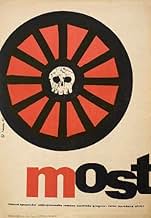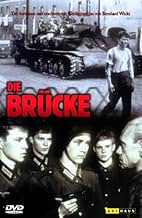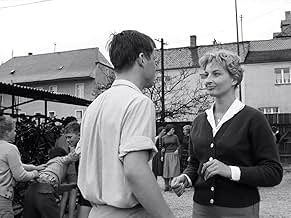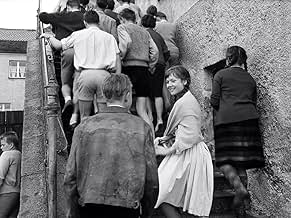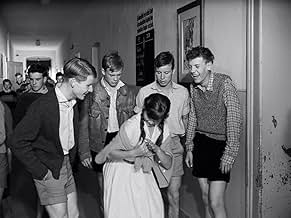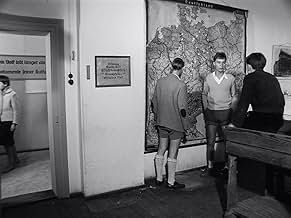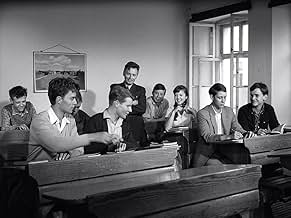AVALIAÇÃO DA IMDb
7,9/10
9 mil
SUA AVALIAÇÃO
Adicionar um enredo no seu idiomaIn 1945, Germany is being overrun, and nobody is left to fight but teenagers.In 1945, Germany is being overrun, and nobody is left to fight but teenagers.In 1945, Germany is being overrun, and nobody is left to fight but teenagers.
- Direção
- Roteiristas
- Artistas
- Indicado a 1 Oscar
- 16 vitórias e 1 indicação no total
Volker Bohnet
- Hans Scholten
- (as Folker Bohnet)
Günter Hoffmann
- Sigi Bernhard
- (as Günther Hoffmann)
Avaliações em destaque
10bugs-32
In my opinion is the best war film I've ever seen. The story is one o the best examples of the nonsense and madness of war. Seems incredible that this movie has been done by Germany and released after 14 years since the end of the war. You can see a traumatic passage from childhood to maturity in the principal characters. The film is from the late fifties so there is no big special effects like "saving private Ryan". Also, the movie is not showing a major and historical battle, with a lot of soldiers and tanks fighting between explosions. In fact,the war scenes can be seen only in the last half hour. The final scene on the bridge is one of the most disturbing scenes of war films.
A couple of days before the end of World War II, seven sixteen year-old German boys of a small village are recruited for military service. The idealistic Hans Scholten (Folker Bohnet), Albert Mutz (Fritz Wepper), Walter Forst (Michael Hinz), Jurgen Borchert (Frank Glaubrecht), Karl Horber (Karl Michael Balzer), Klaus Hager (Volker Lechtenbrink) and Sigi Bernhard (Günther Hoffmann) join the army on 26 April 1945 with great expectations and enthusiasm to defend their motherland Germany in the front against the will of their parents. Their English teacher Stern (Wolfgang Stumpf) unsuccessfully tries to convince Commander Fröhlich (Heinz Spitzner) to refuse the enlistment of the youngsters. After one day training, the soldiers are summoned to the front but the Commander of the 463rd Battalion of the 3rd Company assigns Sergeant Heilmann (Günter Pfitzmann) to stay with the rookies "protecting" a useless bridge in their village in order to spare the boys. However, in the chaos of the imminent defeat with German soldiers fleeing from the American troops, Heilmann is murdered and the boys defend the small bridge with their lives on 27 April 1945.
"Die Brücke" is another powerful and impressive German film about coming of age in times or war. This anti-war movie probably reflects the thoughts of the brain-washed youngsters by the Nazi ideology and propaganda in the 40's and is heartbreaking to see sixteen year-old boys playing war like a game and without awareness of the seriousness of the situation. Being a father, it is also very sad to see the powerless widows and mothers trying to protect their enthusiastic sons that want to fight to defend their country. The realism of this dramatic movie is awesome and totally different from the approach of Hollywood movies, where Germans are usually evil soldiers and the situation of the civilian population is forgotten, but unfortunately it has not been released in Brazil on VHS or DVD. My vote is eight.
Title (Brazil): Not Available
"Die Brücke" is another powerful and impressive German film about coming of age in times or war. This anti-war movie probably reflects the thoughts of the brain-washed youngsters by the Nazi ideology and propaganda in the 40's and is heartbreaking to see sixteen year-old boys playing war like a game and without awareness of the seriousness of the situation. Being a father, it is also very sad to see the powerless widows and mothers trying to protect their enthusiastic sons that want to fight to defend their country. The realism of this dramatic movie is awesome and totally different from the approach of Hollywood movies, where Germans are usually evil soldiers and the situation of the civilian population is forgotten, but unfortunately it has not been released in Brazil on VHS or DVD. My vote is eight.
Title (Brazil): Not Available
When I saw in news accounts the lovely yet fearful face of a 16 year-old, who had defected from the Taliban during the campaign against terrorists in Afghanistan, in the aftermath of the 9/11, I was taken back to Bernhard Wicki's Die Brücke (The Bridge), to the faces of young German boys who were recruited by the Nazis to defend a "last" bridgehead, in the final days of World War II in Europe. In both cases, young "true believers" were used as cannon fodder by cynical adults in their futile power games, which they had disguised as moral crusades.
A tiny band of boys, holding weapons as big as they, their bodies and faces still soft and fresh and tight, facing the juggernaut of tanks and artillery and machine guns which we know will soon tear them to pieces. And for what? An ideal?
I suspect that The Bridge was the basis for the Timothy Hutton, Sean Penn vehicle, "Taps". However, The Bridge is the starker and more brutal treatment because, unlike the what-if story of Taps, the what-if does not apply to The Bridge. In fact, throughout history, the use of children in furtherance of warfare has a sickening frequency, the earliest I know of being the Children's Crusade, and now we have the Tamil Tigers (little girls with lockets of cyanide vials) and Palestinian boy bombs.
The Bridge deserves to be revived and shown to as wide an audience as possible in this Dastardly New World we live in.
A tiny band of boys, holding weapons as big as they, their bodies and faces still soft and fresh and tight, facing the juggernaut of tanks and artillery and machine guns which we know will soon tear them to pieces. And for what? An ideal?
I suspect that The Bridge was the basis for the Timothy Hutton, Sean Penn vehicle, "Taps". However, The Bridge is the starker and more brutal treatment because, unlike the what-if story of Taps, the what-if does not apply to The Bridge. In fact, throughout history, the use of children in furtherance of warfare has a sickening frequency, the earliest I know of being the Children's Crusade, and now we have the Tamil Tigers (little girls with lockets of cyanide vials) and Palestinian boy bombs.
The Bridge deserves to be revived and shown to as wide an audience as possible in this Dastardly New World we live in.
German war drama from Deutsche Film Hansa and director Bernhard Wicki. In the waning days of WW2, a group of German high school friends all get drafted into the army, much to their excitement. However, with literally only a single day's worth of training, they are sent to their hometown to guard a small bridge until it can be destroyed by a demolition crew. The young men take their task very seriously, leading to tragic results
The 100 minutes film spends the first hour establishing the characters of each of the young men, so that the frenetic last act becomes even more devastating, as these are fully fleshed out individuals instead of the too-frequent ciphers and cliches found in many war films. The tone is distinctly anti-war, but the movie is never preachy, and the futility of their actions is made apparent naturally, without contrivance. The filmmaking in the final stretch of the film is ahead of its time in the use of rapid edits, traveling camera shots, and zooms. The movie was nominated for the Best Foreign Language Film Oscar (it lost to Black Orpheus). Recommended.
The 100 minutes film spends the first hour establishing the characters of each of the young men, so that the frenetic last act becomes even more devastating, as these are fully fleshed out individuals instead of the too-frequent ciphers and cliches found in many war films. The tone is distinctly anti-war, but the movie is never preachy, and the futility of their actions is made apparent naturally, without contrivance. The filmmaking in the final stretch of the film is ahead of its time in the use of rapid edits, traveling camera shots, and zooms. The movie was nominated for the Best Foreign Language Film Oscar (it lost to Black Orpheus). Recommended.
This German contender for the Best Foreign Language Film Oscar is an unflinching war effort that obviously draws comparisons – in its narrative depicting the disillusionment experienced by a number of schoolboys-turned-soldiers – with ALL QUIET ON THE WESTERN FRONT (1930), albeit dealing with the subsequent world conflict. Though only rated * by the "Leslie Halliwell Film Guide", it boasts a favourable write-up therein – on the other hand, I was under the impression that it was given more than *** in the Leonard Maltin equivalent! For the record, it has received its due in "War Movies" – an oversized but appealing book on the subject owned by my father – and is even listed in the all-time top 3,000 movies ranked by the "Wonders In The Dark" website.
The acclaim this garnered upon release won Wicki the co-director gig on Darryl F. Zanuck's super production revolving around the D-Day landings THE LONGEST DAY (1962); his brief Hollywood tenure also comprised THE VISIT (1964) and, another WWII adventure, MORITURI (1965) – a distinguished actor in his own right, he is perhaps best-known for his supporting turn in Michelangelo Antonioni's LA NOTTE (1961). With respect to the film's cast, only the face of a youthful Fritz Wepper – future co-star of CABARET (1972) and the "Derrick" TV series – was familiar to this viewer. Oddly boasting no credits on the print I watched (except for the title and company credits!), this competed at the Oscars against Italy's THE GREAT WAR – a viewing of which followed in quick succession – that concerned itself, albeit on a vaster scale and in a serio-comic tone, with WWI but they were surprisingly defeated by the exotic French entry i.e. BLACK ORPHEUS.
The movie is basically divided into three parts: the first 40 minutes showing the boys in school; the next 30 illustrating their basic training and posting; and the last half-hour being devoted to the combat sequences. Most of the teenage boys are coming-of-age and experience their first sexual hang-ups before being sent to the front: a blond boy with the only female student in the class; another the salesgirl in his father's shop (who is also the boss' lover); and the cowardly Mayor's son towards the gymnasium instructor in a nearby girls' school. The battle scenes are certainly effectively rendered and appropriately harrowing, if occasionally over-the-top: a G.I., astonished to be confronted by a bunch of 16 year-olds, tells them to run off to their mothers but they find his condescending attitude insulting and he is literally gutted by their response!; an equally disdainful local, then, has his face blown off and body scarred by a backfiring bazooka, etc. The supreme irony of the film is that, while the boys' superior officer (who is himself shot almost instantly for apparent desertion by his own compatriots!) orders them to defend the expendable bridge ostensibly to keep the kids out of harm's way, the fact that the German forces intend blowing it up regardless so as to stem the Allied advance ensures that all but one of the fresh-faced soldiers sacrifice their lives to the fatherland unnecessarily!
The acclaim this garnered upon release won Wicki the co-director gig on Darryl F. Zanuck's super production revolving around the D-Day landings THE LONGEST DAY (1962); his brief Hollywood tenure also comprised THE VISIT (1964) and, another WWII adventure, MORITURI (1965) – a distinguished actor in his own right, he is perhaps best-known for his supporting turn in Michelangelo Antonioni's LA NOTTE (1961). With respect to the film's cast, only the face of a youthful Fritz Wepper – future co-star of CABARET (1972) and the "Derrick" TV series – was familiar to this viewer. Oddly boasting no credits on the print I watched (except for the title and company credits!), this competed at the Oscars against Italy's THE GREAT WAR – a viewing of which followed in quick succession – that concerned itself, albeit on a vaster scale and in a serio-comic tone, with WWI but they were surprisingly defeated by the exotic French entry i.e. BLACK ORPHEUS.
The movie is basically divided into three parts: the first 40 minutes showing the boys in school; the next 30 illustrating their basic training and posting; and the last half-hour being devoted to the combat sequences. Most of the teenage boys are coming-of-age and experience their first sexual hang-ups before being sent to the front: a blond boy with the only female student in the class; another the salesgirl in his father's shop (who is also the boss' lover); and the cowardly Mayor's son towards the gymnasium instructor in a nearby girls' school. The battle scenes are certainly effectively rendered and appropriately harrowing, if occasionally over-the-top: a G.I., astonished to be confronted by a bunch of 16 year-olds, tells them to run off to their mothers but they find his condescending attitude insulting and he is literally gutted by their response!; an equally disdainful local, then, has his face blown off and body scarred by a backfiring bazooka, etc. The supreme irony of the film is that, while the boys' superior officer (who is himself shot almost instantly for apparent desertion by his own compatriots!) orders them to defend the expendable bridge ostensibly to keep the kids out of harm's way, the fact that the German forces intend blowing it up regardless so as to stem the Allied advance ensures that all but one of the fresh-faced soldiers sacrifice their lives to the fatherland unnecessarily!
Você sabia?
- CuriosidadesThe end credits suggest that the story relates to true events which supposedly happened on "April 27, 1945", but this specific story is fictitious, while the general use of teenage boys as soldiers in the last days of the Third Reich is accurate.
- Erros de gravaçãoWhen the boys are assembled at night, they are told they will be part of the 336th Division. That unit was destroyed and surrendered to the Soviets on the Eastern Front nearly a year earlier in 1944 and was never reformed.
- Citações
Sigi Bernhard: Whoever defends one square foot of German soil defends Germany!
- Versões alternativasAn English dubbed version was released in the USA in 1963.
- ConexõesEdited into Bernhard Victor Christoph Carl von Bülow genannt Loriot (2008)
Principais escolhas
Faça login para avaliar e ver a lista de recomendações personalizadas
Detalhes
- Tempo de duração1 hora 43 minutos
- Cor
- Mixagem de som
Contribua para esta página
Sugerir uma alteração ou adicionar conteúdo ausente


